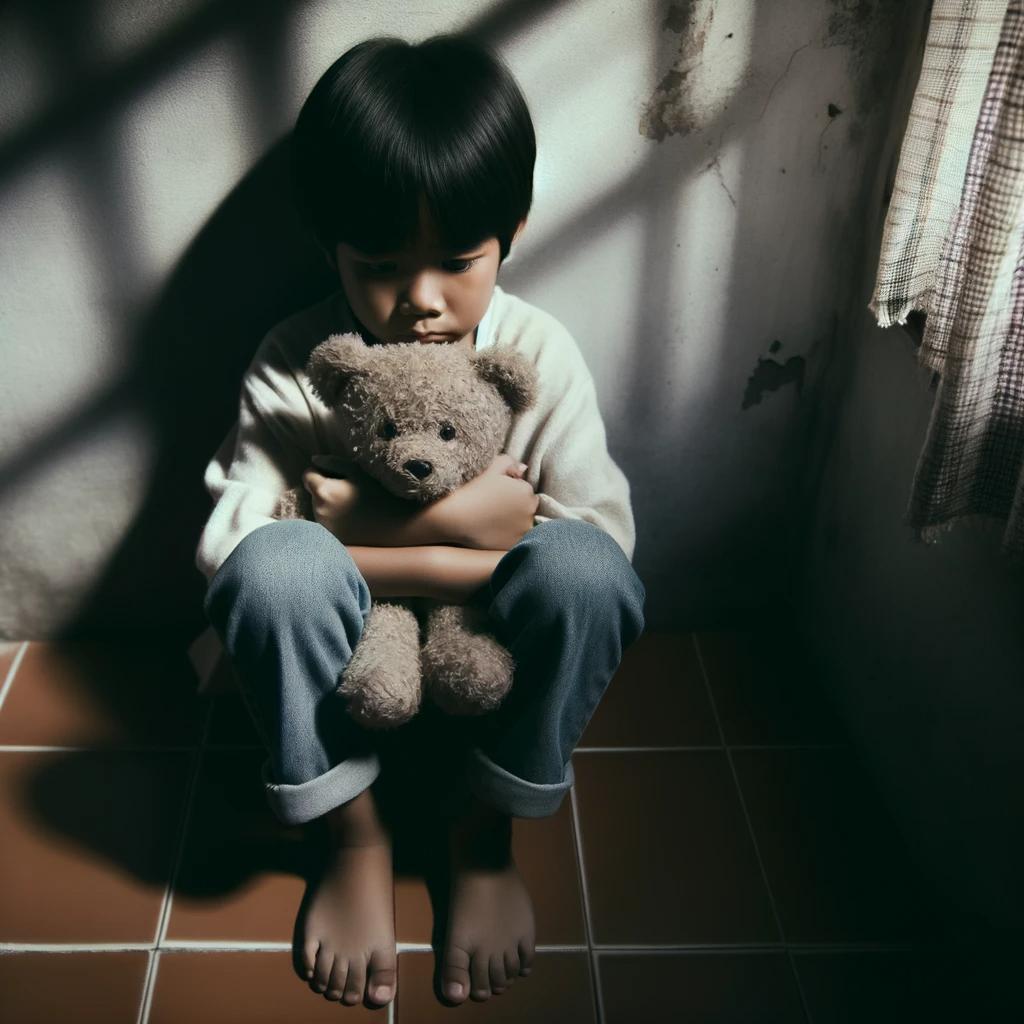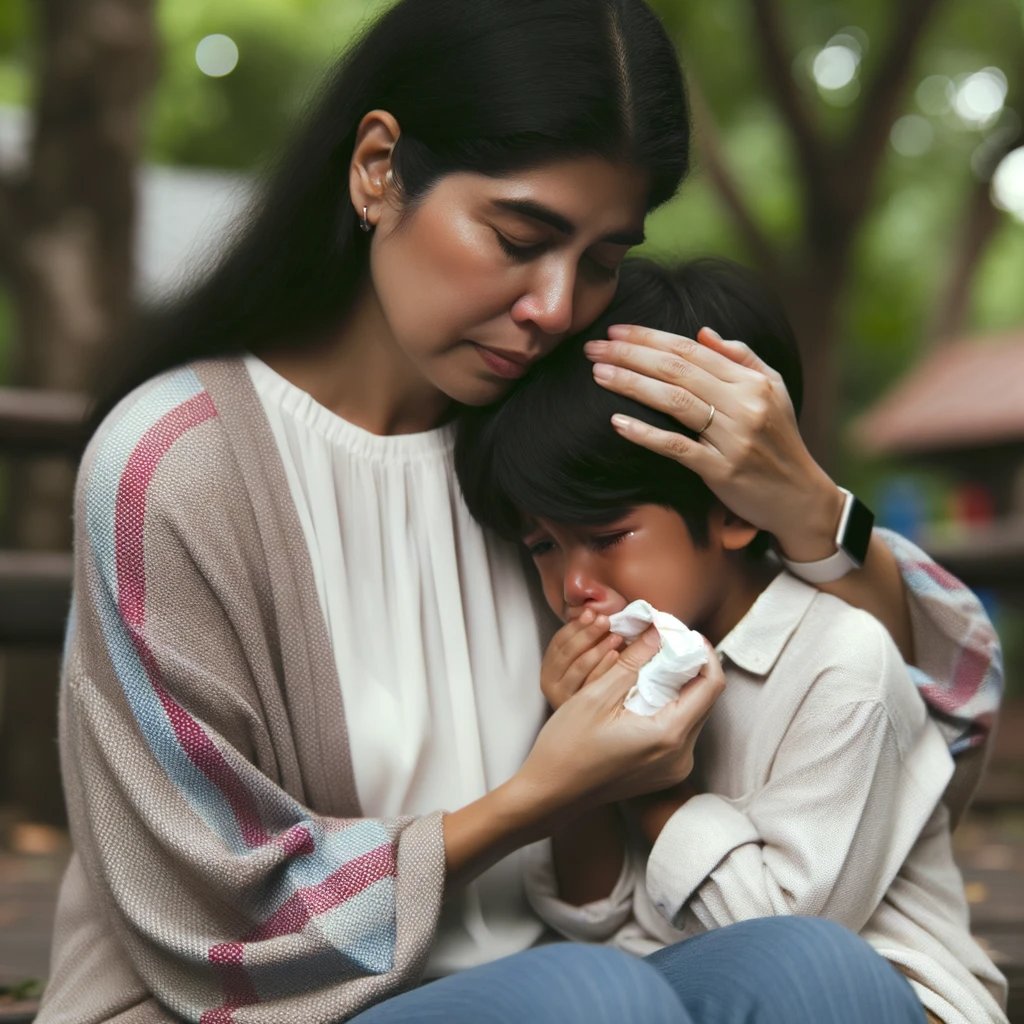Divorce can be a challenging and emotional experience for everyone involved, particularly children. The impacts of divorce on a child’s emotional health can be significant, and it is essential to understand and address these effects to support children through this difficult time.
Children may experience a wide range of emotions during the divorce process, including confusion, sadness, and insecurity. These feelings can have a lasting impact on their emotional well-being and development. Therefore, it is crucial to consider the psychological effects of divorce on children and take steps to mitigate any negative impacts.

- How Does Divorce Affect Children?
- Understanding Children’s Mental Health in Divorce
- Factors Influencing Child Emotional Health During Divorce
- Coping Strategies for Children During Divorce
- The Role of Parental Support in Child Emotional Health
- Seeking Professional Help for Children During Divorce
- Communicating with Children about Divorce
- Building Resilience in Children After Divorce
- Co-Parenting for Child Emotional Well-Being
- Conclusion

Key Takeaways:
- Divorce can have a significant impact on the emotional health of children.
- Children may experience a range of emotions, including confusion, sadness, and insecurity during the divorce process.
- It is essential to understand the psychological effects of divorce on children and take steps to support their emotional well-being.
- Early intervention and seeking professional help can help mitigate the negative impacts of divorce on children.
- Effective co-parenting and communication can also play a crucial role in supporting children’s emotional health during and after divorce.
How Does Divorce Affect Children?
Divorce is a significant life event that can have a profound emotional impact on children. It can be a confusing and overwhelming experience, causing children to feel a range of intense emotions.
One of the most common emotional reactions that children experience during divorce is sadness. They may feel a sense of loss or grief over the changes to their family dynamic and the separation from one parent. This sadness can sometimes turn into depression, which can have long-lasting effects on their emotional well-being.
Anger is another common emotional reaction that children may exhibit during divorce. They may feel frustrated about the situation and resentful towards their parents for causing it. This anger can manifest in different ways, such as acting out, displaying aggressive behavior or shutting down emotionally.


Confusion is also a common emotional reaction to divorce. Children may struggle to understand why their parents are separating and have difficulty processing the changes to their family unit. This confusion can lead to feelings of anxiety and uncertainty about the future.
Lastly, divorce can cause children to feel insecure. They may worry about their own relationships and whether they will also experience a breakup. This can lead to a lack of trust and a feeling of instability in their lives.
It’s important to remember that every child is unique and will react to divorce in their own way. Some children may experience all of the above emotions, while others may only feel one or two. It’s crucial for parents to be aware of their children’s emotional state during divorce and to provide support and understanding throughout the process.
How Does Divorce Affect Children Long-Term?
The emotional impact of divorce on children can have long-term effects on their mental health and well-being. Children who experience emotional difficulties in response to their parents’ divorce may be at a higher risk of developing mental health issues, such as anxiety and depression, later in life.
Additionally, divorce can also affect children’s ability to form healthy relationships in the future. They may develop trust issues or struggle with attachment as a result of their experience with their parents’ relationship breakdown.
It’s important for parents to prioritize their children’s emotional well-being during and after divorce. Seeking professional help and providing a supportive environment can go a long way in helping children navigate their emotions and build resilience for their future.
Understanding Children’s Mental Health in Divorce
Divorce can have a significant emotional effect on children, potentially leading to mental health issues such as anxiety and depression. Children may feel overwhelmed, confused, and powerless during this difficult time, which can negatively impact their emotional and mental well-being.
It is important to understand how divorce affects children’s mental health to provide the necessary support and intervention. Children may experience a range of emotional responses, including sadness, anger, fear, and guilt. These emotions can manifest in various behavioral changes, such as withdrawal, aggression, irritability, and poor academic performance.


Research has shown that the impact of divorce on children’s mental health can be long-lasting, leading to issues such as low self-esteem, mood disorders, and substance abuse. Early intervention and support can mitigate these effects and promote healthy emotional development.
Parents can support their children’s emotional well-being by maintaining open communication, providing reassurance, and seeking professional help when necessary. Therapists and counselors can provide specialized guidance and interventions to help children cope with the emotional impact of divorce.
It is important for parents to prioritize their children’s mental health during and after divorce. Providing consistent emotional support, minimizing conflict, and focusing on the child’s best interests can promote a sense of security and stability, which is crucial for children’s emotional well-being.
Factors Influencing Child Emotional Health During Divorce
Divorce can have a significant impact on a child’s emotional health. However, the degree of this impact can vary depending on a range of factors.
Parental Conflict
One crucial factor that can influence a child’s emotional health during divorce is the level of parental conflict. Children who are exposed to frequent and intense conflict between their parents may experience greater levels of stress, anxiety, and insecurity.


It is therefore important for parents to strive for a peaceful and amicable separation, minimizing conflict as much as possible. This can be achieved through effective communication, compromise, and seeking professional help when needed.
Quality of Parent-Child Relationship
The quality of the parent-child relationship can also have a significant impact on a child’s emotional well-being during divorce. Children who have strong, positive relationships with both parents may be better equipped to navigate the challenges of divorce.
Parents can promote healthy parent-child relationships by maintaining consistent and meaningful contact with their children, actively listening to their needs and concerns, and prioritizing their emotional well-being above all else.
Support Systems
Another important factor that can influence a child’s emotional health during divorce is the availability of support systems. Children who have access to supportive adults, such as grandparents, teachers, or therapists, may be better equipped to cope with the emotional challenges of divorce.
Parents can help build a support network for their children by reaching out to trusted individuals in their community, such as family members, friends, or professionals. Additionally, some community organizations offer support groups or counseling services for children going through divorce.
Promoting Positive Emotional Well-Being
Finally, it is essential for parents to take an active role in promoting their child’s positive emotional well-being during divorce. This can be achieved through various strategies, such as maintaining routines and consistency, fostering open communication, and modeling healthy coping mechanisms.
Parents may also consider seeking professional help, such as family therapy or counseling, to support their child’s emotional well-being during this challenging time.
Coping Strategies for Children During Divorce
Divorce can be an emotionally challenging time for children, but there are strategies that parents can use to support their child’s emotional health during this period.
Encourage Open Communication
Encouraging open communication with your child is an important strategy for helping them cope with the emotional challenges of divorce. Make it clear that they can come to you with their feelings and concerns. Validate their emotions and provide reassurance that they are loved and supported.
Maintain Routines
Maintaining routines can help provide a sense of stability and security for your child. Try to maintain regular mealtimes, bedtimes, and other daily routines as much as possible. This can help create a sense of predictability and structure during a time of uncertainty.
Seek Professional Help
If your child is struggling to cope with the emotional impact of divorce, seeking professional help can be beneficial. A therapist or counselor can provide specialized guidance and interventions to support your child’s emotional well-being, and support groups can offer a supportive community for both you and your child.
Foster Coping Mechanisms
Encourage your child to develop healthy coping mechanisms, such as engaging in physical activity, practicing relaxation techniques, or creative activities like art, music, or writing. These activities can help your child manage their emotions and reduce stress.
Provide Age-Appropriate Explanations
When communicating with your child about divorce, it’s important to provide age-appropriate explanations that are easy for them to understand. Avoid sharing details that are too complex or difficult for them to process. Use language that is clear, direct, and concise.
Emphasize Co-Parenting
Co-parenting can play a crucial role in supporting your child’s emotional well-being during divorce. Work together with your co-parent to establish consistent rules and routines, minimize conflict, and prioritize your child’s best interests. Consistent parenting between households can help your child feel secure and supported.
Overall, supporting your child’s emotional health during divorce requires patience, understanding, and a willingness to prioritize your child’s needs above all else. With these coping strategies in mind, you can help your child navigate this challenging experience and emerge stronger and more resilient in the long run.
The Role of Parental Support in Child Emotional Health


Parents play a crucial role in supporting their children’s emotional well-being during divorce. Building a positive co-parenting relationship and prioritizing the child’s needs above parental conflicts can significantly impact a child’s emotional health and resilience.
Consistent Emotional Support
Providing consistent emotional support is essential for children going through divorce. Parents can reassure their children of their love and support through regular communication and quality time together. This can help alleviate feelings of insecurity or abandonment that children may experience during this difficult time.
Maintaining a Stable Home Environment
Creating stability and routine in the home environment can help promote a sense of security and reduce stress for children during divorce. This includes maintaining consistent rules, schedules, and expectations across both households. It can also involve maintaining familiar routines and rituals, such as family traditions or spending time with extended family members.
Minimizing Conflict
Minimizing conflict between parents is crucial for promoting child emotional health during divorce. Parents can work together to minimize the child’s exposure to negative interactions and prioritize their communication and problem-solving skills. This can involve seeking the support of a mediator or therapist to help navigate the complexities of co-parenting.
Promoting a Positive Outlook
Parents can also help promote a positive outlook for their children’s future during divorce. This can involve encouraging them to focus on their strengths and interests, setting achievable goals, and supporting their well-being through healthy habits such as exercise and socializing with friends.
By providing consistent emotional support, creating a stable home environment, minimizing conflict, and promoting a positive outlook, parents can play a vital role in supporting their children’s emotional health during divorce.
Seeking Professional Help for Children During Divorce
Divorce can be a challenging and emotional time for children, and it is not uncommon for them to experience emotional difficulties as a result. Seeking professional help is an important step in ensuring that children have the support and guidance they need to navigate this difficult time.
Therapists, counselors, and support groups can provide children with specialized interventions and guidance to support their emotional well-being during and after the divorce process. These professionals can help children develop healthy coping mechanisms, process their emotions, and build resilience.
It is important to choose a professional who specializes in working with children and has experience in dealing with the emotional impact of divorce. Look for professionals who have relevant qualifications, such as a degree in psychology or counseling, and who have undergone specific training in working with children.
Parents may also benefit from seeking professional support to help them cope with the challenges of co-parenting during and after a divorce. Family therapists can provide guidance on effective co-parenting strategies, communication techniques, and coping mechanisms for parents to support their child’s emotional health.
Remember that seeking professional help is not a sign of weakness. Rather, it is a proactive step towards ensuring that children have the support they need to thrive during and after a divorce. By prioritizing their emotional well-being, parents can help their children develop the resilience and coping skills they need to navigate this difficult time.
Communicating with Children about Divorce
When it comes to discussing divorce with your child, communication is key. Although it can be a difficult conversation to have, it is important to create a safe space for your child to express their thoughts and feelings. The following tips can help you communicate effectively with your child about your divorce:
- Be honest: It’s essential to be honest and direct with your child about the reasons for the divorce. Keep in mind that age-appropriate language is key – it’s important to frame the conversation in a way that your child can understand.
- Encourage questions: Let your child know that they can ask questions and express themselves freely. Encourage them to share their thoughts and feelings about the situation.
- Be mindful of the timing: Timing is crucial when it comes to talking to your child about divorce. Avoid discussing it when you or your child are upset, tired, or distracted. Choose a time when you can both give the conversation your full attention.
- Reassure your child: Let your child know that they are loved and supported, and that the divorce is not their fault. Offer reassurance that you will do everything you can to support them through the process.
- Listen actively: Active listening is key when it comes to communicating with your child about divorce. Pay attention to what they’re saying, respond with empathy, and validate their feelings.




REMEMBER
DIVORCE can be a challenging time for children, but open and honest communication can go a long way in helping them process their emotions and adjust to the changes ahead.tag/label pattern. A great way of highlighting some important info.
Building Resilience in Children After Divorce
Divorce can be an incredibly challenging experience for children, impacting their emotional well-being in a variety of ways. However, with the right support and strategies, it is possible to help children build resilience and navigate the transition with greater ease. Here are some tips on how to promote resilience in children after divorce.
Encourage Open Communication
Encouraging open communication is crucial in helping children build resilience after divorce. By creating a safe space for them to express their emotions and concerns, you can help them feel heard and understood. Make it clear that it’s okay to share their feelings, whatever they may be, and reassure them that you are there to support them through the process.
Establish Routines
Establishing routines can help children feel secure and provide a sense of stability during a time of upheaval. Try to maintain consistency in their daily schedule as much as possible, including mealtimes, bedtime, and extracurricular activities. This can help them feel more grounded and reassured that life is continuing as normal, despite the changes happening around them.
Promote Self-Care
Promoting self-care is essential in helping children build resilience after divorce. Encourage activities that help your child relax and recharge, such as reading, playing sports, or spending time with friends. Teaching your child self-care practices can help them develop effective coping strategies that they can use throughout their life.
Seek Professional Support
Seeking professional support can be incredibly beneficial for children who are struggling to cope with the emotional impact of divorce. Therapists and counselors can provide specialized guidance and interventions to support their emotional well-being. Support groups can also give children an opportunity to connect with others who are going through a similar experience.
Stay Positive
Staying positive can help children develop a more optimistic outlook for their future. Try to focus on the positives of the situation, such as the opportunity for growth and new experiences. Encouraging your child to focus on the things they are looking forward to can help them find hope and build resilience.
By following these tips, you can help your child build resilience and navigate the challenges of divorce with greater ease. Remember to prioritize their emotional well-being and seek professional support when needed. With time and support, both you and your child can emerge from this experience stronger and more resilient than ever before.
Co-Parenting for Child Emotional Well-Being
Co-parenting after divorce is critical in promoting a child’s emotional well-being. The way parents handle their relationship can have a significant impact on their child’s emotional health and overall adjustment to the new family structure. Here are some strategies for effective co-parenting:
- Communicate openly: Effective communication is key to successful co-parenting. Parents should aim to communicate honestly and respectfully with each other, keeping lines of communication open to discuss any issues that may arise. This helps to avoid misunderstandings and conflicts that could negatively affect the child’s emotional well-being.
- Put the child first: Co-parenting should always prioritize the child’s needs above the parents. This means making decisions that are in the best interest of the child and putting aside personal differences to ensure the child’s emotional health is not compromised.
- Maintain consistency: Children need consistency in their lives, especially during the tumultuous time of divorce. Co-parents can help provide this consistency by maintaining regular routines and patterns of behavior that the child can rely on. This can include things like consistent schedules, rules, and consequences.
- Minimize conflict: Conflict between co-parents can have a significant negative impact on a child’s emotional health. Parents should strive to minimize conflict in front of their child, avoid using their child as a messenger between them, and keep any negative feelings or criticisms of their co-parent to themselves.
- Be flexible: Co-parenting can require flexibility and compromise. Parents should be willing to work together to find solutions that work for everyone involved, including the child. This may require adjustments to schedules or other plans in order to accommodate everyone’s needs.
Effective co-parenting can be challenging, but it is crucial to promoting a child’s emotional well-being during and after divorce. By prioritizing the child’s needs, communicating openly and respectfully, maintaining consistency, minimizing conflict, and being flexible, co-parents can create a positive and stable environment for their child to thrive in.
Conclusion
Divorce can be a challenging time for both parents and children. However, it is crucial to prioritize the emotional well-being of children during this process. By understanding the impact of divorce on child’s emotional health and taking steps to address their needs, parents can help their children navigate this difficult experience with resilience and strength.
Supporting Child Emotional Health and Divorce
Effective communication, positive co-parenting, and seeking professional help when needed are essential strategies for supporting child’s emotional health and divorce. By maintaining consistency, minimizing conflict, and prioritizing the child’s best interests, parents can foster a sense of stability and security for their children.
Building Resilience in Children
Through the development of healthy coping mechanisms, promoting a positive outlook, and providing a sense of security, parents can help their children build resilience after divorce. By encouraging open communication and offering consistent emotional support, parents can help their children navigate the emotional challenges of divorce.
Seeking Professional Help
If children experience emotional difficulties during divorce, seeking professional help can be beneficial. Therapists, counselors, and support groups can provide specialized guidance and interventions to support children’s emotional well-being, helping them cope with the challenges of divorce.




REMEMBER
DIVORCE is a challenging time, but it does not have to be a negative experience for children. By prioritizing their emotional health and well-being, parents can help their children develop resilience and strength, leading to a positive outlook for their future.


FAQ
What are the psychological effects of divorce on children?
Divorce can have various psychological effects on children, including feelings of sadness, anger, confusion, and insecurity. It can also lead to changes in behavior and academic performance.
Can divorce impact a child’s long-term emotional well-being?
Yes, divorce can have long-term effects on a child’s emotional well-being. It is important to provide support and address any emotional difficulties that may arise during and after the divorce.
How does divorce affect a child’s mental health?
Divorce can increase the risk of mental health issues in children, such as anxiety and depression. It is crucial to monitor and address any signs of distress or changes in behavior.
What factors can influence a child’s emotional health during divorce?
Several factors can influence a child’s emotional health during divorce, including the level of parental conflict, the quality of the parent-child relationship, and the availability of support systems.
What coping strategies can help children during divorce?
Some coping strategies for children during divorce include maintaining routines, fostering open communication, seeking support from trusted adults, and engaging in activities that promote emotional well-being.
How important is parental support for a child’s emotional health during divorce?
Parental support is crucial for a child’s emotional health during divorce. Maintaining a positive co-parenting relationship, providing consistent emotional support, and prioritizing the child’s well-being are essential.
Is seeking professional help beneficial for children during divorce?
Yes, seeking professional help, such as therapy or counseling, can provide children with specialized guidance and interventions to support their emotional well-being during the divorce process.
How can parents effectively communicate with their children about divorce?
Effective communication with children about divorce involves providing age-appropriate explanations, encouraging open dialogue, reassurance of continued love and support, and addressing their concerns and emotions.
How can resilience be built in children after divorce?
Building resilience in children after divorce involves helping them develop healthy coping mechanisms, fostering a sense of security and stability, promoting a positive outlook for the future, and providing ongoing support and understanding.
What role does co-parenting play in a child’s emotional well-being after divorce?
Co-parenting plays a significant role in supporting a child’s emotional well-being after divorce. Effective co-parenting involves maintaining consistency, minimizing conflict, and prioritizing the child’s best interests.





Leave a Reply